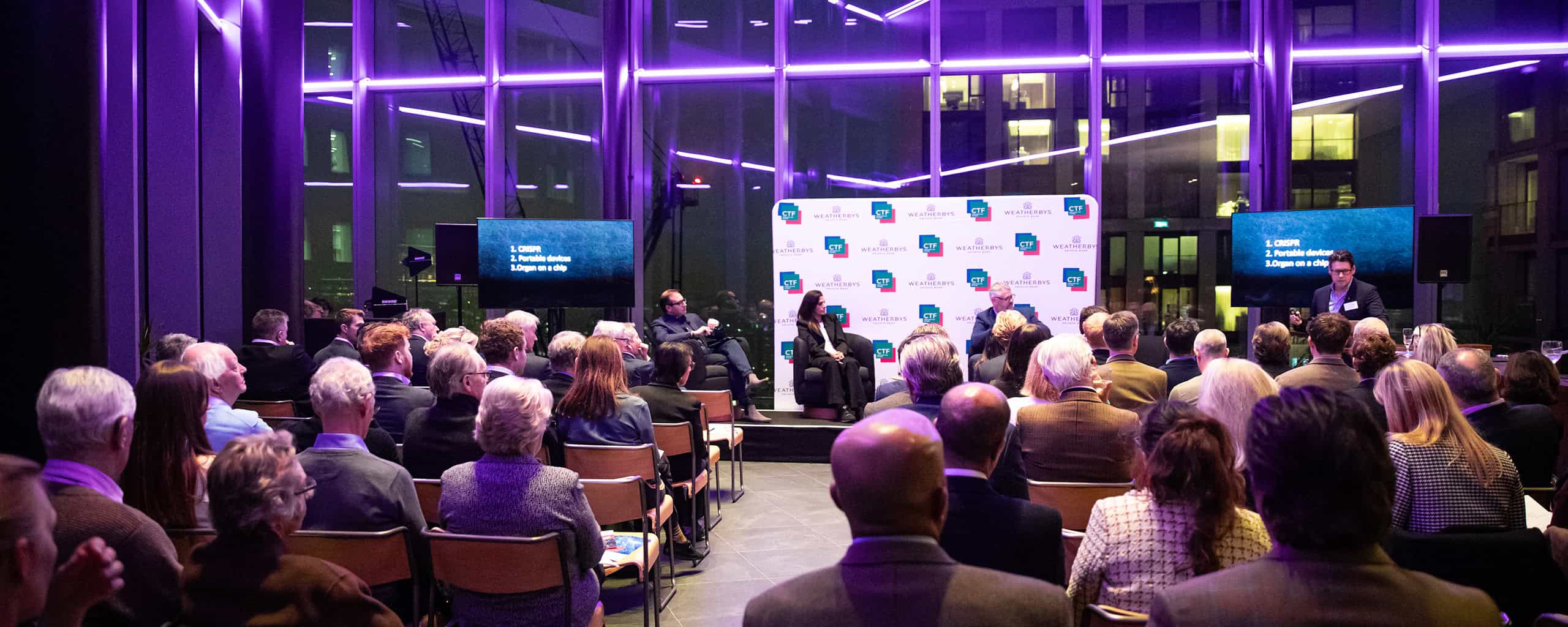
Electricity and telephones took 30 years to reach three-quarters of Americans, yet TikTok had 3 billion users after just five years. Fast forward to 2023 and the fastest platform ever to reach 100 million users is the generative AI-driven Chat GPT. But as our speakers delved into the powers of AI, it became apparent that searching for an answer or creating a picture using a generative AI application merely scratches the surface of how this emerging technology can truly transform our lives.
We heard from Priya Lakhani, CEO of Century Tech, on how AI is proving a game-changer for education and from Wired editor-in-chief, Greg Williams about how AI is shaping the future of medicine and from Danil Mikhailov from data.org on how AI is supporting areas such as health, climate and financial inclusion.
“If you all think AI is just ChatGPT, you are missing a lot of opportunity when it comes to your businesses, your professions, or your investments.”
Priya Lakhani OBE Founder-CEO, CENTURY Tech
How data can transform your child’s education
Priya’s world changed a decade ago when she was sitting on the Secretary of State for Business Innovation and Skills advisory board. In walks Matthew Hancock, the then minister of state for education to proclaim that more than 20 per cent of UK children leave school without being able to read, write and do math’s well enough to get a good job. Teachers are teachers by day, but data analysts by night, marking and trying to figure out what their pupils understand, says Priya. Her answer was to build “the Google search for education” that tracks every movement a student makes. This AI machine collects unstructured data to find patterns and correlations in how children learn, what they are weak at and what they master to give them a personalised educational pathway.
“Every school is different; every child is different and every teacher is different. But when you walk into a school, and you walk into that classroom and you close the door, what does the delivery of education look like in schools across the world? It looks the same. You have a teacher standing in the front of the room trying to deliver education. The problem is the one-size-fits-all delivery of education doesn’t work. It doesn’t personalise for every individual. Ask a teacher with 25-60 children in a classroom to [decipher] how their brains learn is impossible. AI can do it easily.”
Priya Lakhani OBE Founder-CEO, CENTURY Tech
AI powers our creativity, perception, decision-making and understanding
Greg says he is lucky. He gets to spend his days talking to the people who are thinking about how the world is changing – entrepreneurs, investors, business leaders, technologists and designers – and what that means for healthcare. Against a backdrop of political uncertainty, broken supply chains and volatile energy prices, the landscape is challenging. Quoting Niels Bohr, the Nobel laureate in Physics, “Prediction is very difficult, especially if it’s about the future” Greg highlights AI will accelerate drug discovery, help us understand diseases better, personalise medicines and broaden research. He explains how Moorfields Eye Hospital and Google DeepMind are using AI to help spot rear eye diseases; how AI is revolutionising protein folding research and how it is helping us understand the human genome and modify DNA.
“We’re living in a world where machine learning, computational biology, battery technology, renewables and robotics are all coming together and accelerating each other in industrial and consumer applications that will have a real business impact and offer solutions to some of the greatest challenges that humankind faces.”
Greg Williams Editor-in-Chief, Wired UK
Data is the new oil
Data underpins AI technology and as Danil Mikhailov from data.org explains, is in many ways the new oil – yet the gap between those who can use data effectively to create generative AI models and those who cannot, is growing. All the leading AI research labs are based in the Global North, namely Europe or the US. Most of the world is excluded – and dataorg, a non-profit organisation, was set up to try and narrow the gap. It is working with charities, NGOs, the UN, universities and private companies such as Mastercard, to build the tools needed for, and to train the next generation of data experts, data scientists and engineers in the Global South. More than 60,000 have been trained so far – the goal is to train 1 million.
“How do we help other countries around the world who have less access to resources to at least stay in the ring? They might not be able to compete with Google DeepMind and Open AI but we want them to create, contribute and grow locally. We want AI and data and fruits of that to be truly global.”
Danil Mikhailov Executive Director, data.org
